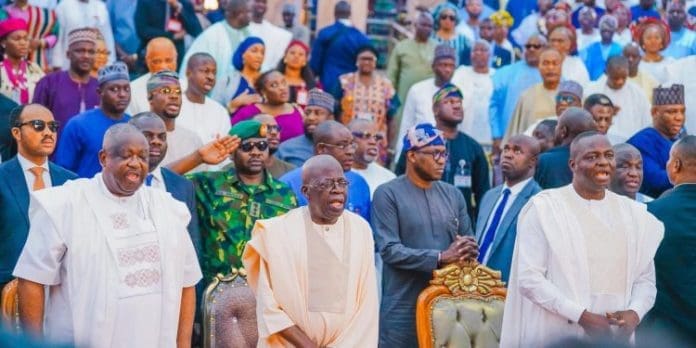Former Vice President Atiku Abubakar has sharply criticized President Bola Tinubu following his weekend trip to Plateau State, questioning the administration’s priorities as insecurity continues devastating communities across Nigeria’s North Central region.
Tinubu traveled to Jos on Saturday to attend the funeral of Lydia Yilwatda, mother of the All Progressives Congress (APC) National Chairman, Professor Nentawe Yilwatda. The visit sparked immediate controversy from the opposition Peoples Democratic Party (PDP) presidential candidate, who argued the President should have been consoling victims of violent attacks rather than attending a political event.
In a strongly-worded statement posted to his social media platform Saturday evening, Atiku described the visit as “a sad reflection of priorities and a glaring mockery of leadership.” He contended that with significant portions of the country experiencing relentless security challenges, it’s troubling that the President chose to attend what he termed a “political funeral” instead of meeting with communities traumatized by ongoing violence.
“It is deeply unfortunate that President Bola Tinubu has not, for once, found it worthy to visit any of the affected states to commiserate with the grieving citizens,” Atiku stated, adding that thousands of lives have been lost while families continue burying loved ones across affected regions.
The criticism comes against a backdrop of documented violence in Plateau State and surrounding areas. Between December 2023 and February 2024, at least 1,336 people were killed in Plateau State alone, according to Amnesty International. More than 420 attacks occurred in the state between 2021 and 2024, resulting in over 3,000 deaths and displacing tens of thousands of residents.
Atiku’s statement referenced what he considers a pattern of presidential absence from crisis zones. He recalled Tinubu’s June visit to Benue State, another North Central state experiencing severe insecurity, noting the President never traveled to Yelewata, where a major massacre occurred. Instead, Tinubu remained in the state capital, Makurdi, throughout his visit.
“Even when Tinubu made a symbolic visit to Benue State in June, he never bothered to set foot in Yelewata, the epicenter of the massacre,” the former Vice President observed. “Instead, he ended his trip comfortably in Makurdi, turning his back on the people whose tears and blood still stain the soil.”
The opposition leader characterized Saturday’s presidential visit as demonstrating misplaced priorities. While acknowledging the legitimacy of attending funeral ceremonies, Atiku argued that the President’s physical presence at a party chairman’s family event—while consistently avoiding direct engagement with communities suffering from insecurity—sends problematic signals about what the administration values.
“Between the APC National Chairman and his President, what we witnessed today is a heartless exhibition of disregard for empathy, compassion, and the dignity of human life,” Atiku wrote, describing Tinubu as “a President who would rather feast than feel—a leader who finds pleasure where the people find pain.”
The North Central region, encompassing states like Plateau, Benue, Niger, and Kwara, has experienced some of Nigeria’s most severe security challenges in recent years. By April 2024, over 1.3 million people were internally displaced in the North Central and Northwest regions, up from nearly 1.1 million in December 2023, according to the International Organization for Migration (IOM).
Violence in these areas often involves conflicts between farming communities and herding groups, land disputes, and criminal activities. In Plateau State alone, armed herders carried out 38 attacks during a recent period, with coordinated assaults between March 27 and April 2, 2025, targeting five communities in Bokkos local government area.
Atiku’s statement concluded with a warning that Nigerians are taking note of presidential actions and priorities. “The message could not be clearer: this is a President who would rather feast than feel,” he reiterated. “The Nigerian people are watching, and they will remember.”
The Presidency has not issued an official response to Atiku’s criticism as of Sunday evening. However, the controversy highlights ongoing tensions between the ruling APC and opposition parties over the government’s handling of Nigeria’s complex security challenges, which show little sign of abating despite various military and administrative interventions.
As communities across Plateau and neighboring states continue grappling with violence, displacement, and economic disruption, questions about presidential engagement with affected populations remain central to political discourse heading into Nigeria’s next electoral cycle.
Source: newsghana.com.gh











